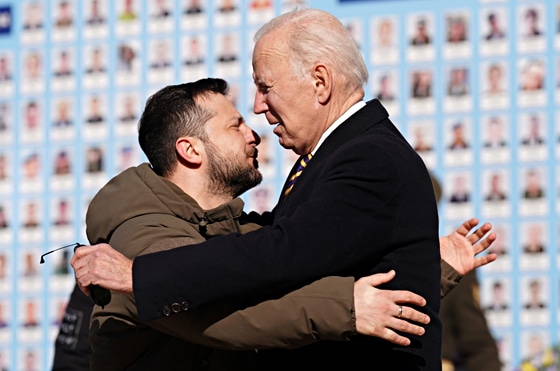When the Soviet Union dissolved in late 1991, the world seemed poised for a new, more peaceful era no longer haunted by the fear of a nuclear Armageddon. The principal successor state from the wreckage of the USSR was a noncommunist Russia that was intent on becoming part of the democratic, capitalist West. President George H. W. Bush and his top advisers exercised considerable diplomatic skill managing the twilight years and ultimate demise of the Soviet Union. Their core achievement was to gain Moscow’s assent to Germany’s reunification and membership in NATO. The implicit tradeoff (unfortunately never put in writing) was that NATO would not expand beyond the eastern border of a newly united Germany.
The contrast between the benign end to the original Cold War and the current status of relations between the West (especially the United States) and Russia could not be greater or more alarming. NATO’s meddling in the armed conflict between Ukraine and Russia has become an outright proxy war for the Alliance. As NATO’s leader, the United States has pushed a series of extremely dangerous escalatory steps. The latest provocation is the decision by Joe Biden’s administration authorizing Ukraine to use long-range U.S. Army Tactical Missile Systems (ATACMS) that are capable of striking at least 190 miles inside Russia. Moscow has responded by adopting a new nuclear doctrine warning that the use of such missiles by NATO’s Ukrainian proxy would mean that Moscow is officially at war with the U.S.-led alliance. Perhaps Russian President Vladimir Putin is bluffing, but the risk of a nuclear collision between NATO and Moscow now appears to be very high.
It is bitterly ironic that the decision to let Ukraine use U.S. missiles that might trigger World War III has been made by the lamest of lame duck U.S. presidents. At the 59th minute of the 11th hour, the leaders of the Democratic Party pressured Biden to withdraw from the presidential race. They did so because the evidence of his cognitive decline had become undeniable. However, his hand-picked successor, Kamala Harris, then proceeded to lose the presidential election to Republican nominee Donald Trump.
To say that the Biden administration has no mandate to make such a crucial decision involving war and peace would be a monumental understatement. In fairness, though, the current foreign policy crew is not solely responsible for fouling-up relations with Russia and provoking a new cold war with nuclear implications. That “achievement” has been a bipartisan effort taking place over more than 3 decades.
Toward the end of George H. W. Bush’s administration, public opinion polls in Russia showed that nearly 80 percent of Russians held positive views of the United States. In the late stages of the Bill Clinton administration, nearly the same percentage held negative opinions.
It was hardly a surprising development. During his years in office, Clinton and his Russian-hating advisers (especially UN ambassador and later Secretary of State Madeleine Albright) antagonized Moscow on multiple occasions. Washington went out of its way to attack Russia’s long-standing religious and political clients, the Serbs, as the Yugoslav federation disintegrated. However, the Clinton administration’s decision to expand NATO to include Poland, the Czech Republic and Hungary, struck the biggest blow to East-West relations.
Clinton’s successor, George W. Bush, continued and intensified the policy of provoking and antagonizing Russia. Subsequent rounds of NATO expansion brought U.S. military power to Russia’s immediate neighborhood by adding such new members as the three Baltic republics, Slovakia, Bulgaria, and Romania. Most provocative of all, Bush pushed to add Ukraine to the Alliance. Although Germany and France temporarily blocked immediate moves to make Ukraine a member, Washington’s ultimate goal was quite clear.
A rising number and volume of warnings against making Ukraine a NATO asset also came from Putin and other officials. Washington and its key European allies ignored those warnings, but it became clear in 2014 that the Kremlin was not bluffing. When President Barack Obama and key European leaders helped overthrow Ukraine’s generally pro-Russia president and install a regime subservient to NATO, Moscow struck back emphatically, seizing Ukraine’s strategic, but majority Russian populated, Crimean Peninsula.
Relations between the West and Russia continued to deteriorate thereafter. In the autumn of 2021, the Kremlin proposed a new relationship with the West that amounted to Russia’s minimum demands. Those demands included a guaranteed neutral status for Ukraine – thus foreclosing the prospect of Kyiv’s eventual membership in NATO. The Kremlin also sought the withdrawal of advanced U.S. weaponry from the easternmost members of NATO. It amounted to an ultimatum, and when the Biden administration treated Moscow’s demands with contempt, the Kremlin launched a full-scale invasion of Ukraine in February 2022. That offensive, combined with the decision by the United States and its allies to impose severe economic sanctions against Russia, ignited an ever-escalating military crisis.
It is uncertain whether President-elect Trump intends to end the dangerous impasse with Moscow. Contrary to the partisan myth that Trump has been Putin’s puppet, his actual policies during his first term were consistently hardline. One can hope, though, that he has fully understood what a disaster Washington’s love affair with Ukraine has become for both countries. Restoring cooperative bilateral relations with Russia is essential for global peace.
Alarmingly, however, Trump might not get that opportunity, even if he wishes to back away from the beckoning abyss. The lame-duck Biden administration still holds power for nearly another two months, and, if administration leaders are so inclined, that is more than enough time to plunge the country into nuclear war. Biden’s conduct in recent weeks, especially authorizing Ukraine to attack Russia with U.S.-supplied, long-range missiles, is beyond reckless. Biden’s legacy is already bad, but it could become even worse.
Reprinted with permission from Antiwar.com.


